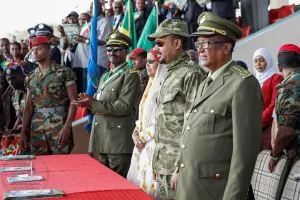In March of 2020, Prime Minister Abiy Ahmed’s government postponed elections in Ethiopia, citing risks to public health amid the pandemic. The leading political party in the country’s northern region of Tigray, the Tigray People’s Liberation Front (TPLF), received the decision with little pleasure. Mr. Abiy—a member of another party who unseated the TPLF from the national stage after 27 years of political dominance—has never been popular with Tigrayan leadership.
In defiance of the federal postponement, the Tigrayan regional government, still dominated by the TPLF, resolved to hold its own elections. When the national election commission rejected this decision as illegal and declined to cooperate, Tigrayan authorities set up their own electoral commission.
Though Mr. Abiy initially vowed not to use force in response to the September election, the TPLF assumed otherwise and preemptively seized military equipment and took thousands of Ethiopian soldiers prisoner. Finally, on November 4, 2020, Mr. Abiy sent troops into the region, beginning the civil conflict which persists today.
In short, TPLF officials viewed the federal government’s postponement of elections as illegal, and Mr. Abiy viewed the defiance as treasonous. Both sides have their claims, and this seems to be the standard explanation for how Ethiopia spiraled into a year of civil conflict and humanitarian disaster.
But in my research, this story left me dissatisfied, only recounting some key events rather than explaining how the Ethiopian state declined to a point that this could happen. After all, Ethiopia was considered an island of relative stability in the region. What’s more, Mr. Abiy’s term in office began with such promise—he forged a peace with neighboring Eritrea and earned a Nobel Peace Prize for his efforts. How did things go so catastrophically wrong?
Here’s the theory that I think seems to make a lot of sense. A quick disclaimer: Ethiopia isn’t quite a democracy as we normally think of it, but the lessons here are important for any kind of state.
First, if political stability is going to have any longevity, the state has to be strong. Independent centers of armed power which can challenge the state from within—such as gangs, cartels, militant political parties, or even overly strong regional governments—are likely to spell trouble.
Second, that strong state also has to be based on institutions rather than personalities or parties. Without that, particularly in states which hold elections, a political system will not be able to find continuity through competition, such as surviving a change in the party that holds political power.
Given these two critical components, we can see how both Mr. Abiy and the TPLF undermined different key aspects of state stability.
When it comes to state strength, the TPLF stands as a clear example of an intolerable independent power center. The fact that the party was able to seize military equipment and take thousands of soldiers hostage suggests that the party possessed a near-paramilitary power. The vestiges of military power are not all that surprising to find, given the party led the armed revolution to establish Ethiopia’s present form of government. William Davison, a Senior Analyst focused on Ethiopia at the International Crisis Group, said, “The TPLF has a particularly strong security sector, but you can find that in a number of regions, not just Tigray.” He added, however, “The fact it has been activated in Tigray against the federal government is a show of defiance that was partly in response to the centralising agenda pursued by the prime minister.”
On that note, when it comes to state institutionalism, some blame may be laid at Mr. Abiy’s feet for personalizing Ethiopia’s government. When it comes to that aforementioned peace with Eritrea, Mr. Davison noted, that “seems to have been more of an understanding between Mr. Abiy and [the president of Eritrea] rather than anything institutional and broader.” Beyond that, Mr. Abiy dissolved the old coalition of all the country’s political parties and formed a new Freedom Party coalition. Mr. Davison says this “took place quickly, and the TPLF refused to partake. It looked like the prime minister was seeking to create a new unitary political structure with himself at the apex.”
He added, “With Mr. Abiy's coming to power and the decline of the TPLF, Ethiopia needed a transition which was careful and inclusive, and the country has had the opposite of that.” While the TPLF’s grip on power for three decades certainly made finding continuity through competition difficult—as the difference between state and party blurred—Mr. Abiy sure made things worse with his personalized approach.
A personal note: I struggled to write this piece not just because the events are complicated and coverage lacking. In any case, it’s a real challenge to write about a civil conflict, because the pressure to ‘pick the right side’ and cover accordingly is so high. But in Ethiopia, and as Harry wrote regarding Yemen, it’s hard to say there are any definitively ‘good guys’ here.
When the political edifice of constrained competition falls away, leaving civil conflict to take its place, goodness or righteousness start to matter a lot less than strength. What’s most important is understanding how states devolve into this kind of chaos so that we can be on the lookout for its warning signs. I hope this piece—along with everything else we do at Spectacles, for that matter—gives you, the reader, some ability to keep an eye out yourself, rather than waiting to hear the postmortem from people like me.
If you’d like to know more about what’s happening in Ethiopia right now and how conflict might be ended, rather than how it began, see this briefing from William Davison at Crisis Group, who so graciously lent us some of his time and expertise to comment.
Subscribe to Spectacles

Comments
Join the conversation